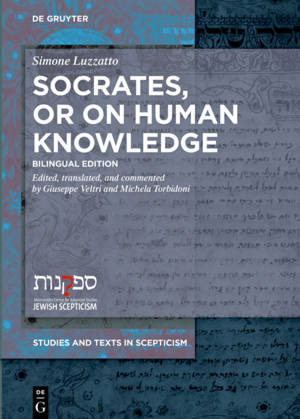
Bedankt voor het vertrouwen het afgelopen jaar! Om jou te bedanken bieden we GRATIS verzending (in België) aan op alles gedurende de hele maand januari.
- Afhalen na 1 uur in een winkel met voorraad
- In januari gratis thuislevering in België
- Ruim aanbod met 7 miljoen producten
Bedankt voor het vertrouwen het afgelopen jaar! Om jou te bedanken bieden we GRATIS verzending (in België) aan op alles gedurende de hele maand januari.
- Afhalen na 1 uur in een winkel met voorraad
- In januari gratis thuislevering in België
- Ruim aanbod met 7 miljoen producten
Zoeken
Omschrijving
Socrates, Or On Human Knowledge, published in Venice in 1651, is the only work written by a Jew that contains so far the promise of a genuinely sceptical investigation into the validity of human certainties. Simone Luzzatto masterly developed this book as a pièce of theatre where Socrates, as main actor, has the task to demonstrate the limits and weaknesses of the human capacity to acquire knowledge without being guided by revelation. He achieved this goal by offering an overview of the various and contradictory gnosiological opinions disseminated since ancient times: the divergence of views, to which he addressed the most attention, prevented him from giving a fixed definition of the nature of the cognitive process. This obliged him to come to the audacious conclusion of neither affirming nor denying anything concerning human knowledge, and finally of suspending his judgement altogether.
This work unfortunately had little success in Luzzatto's lifetime, and was subsequently almost forgotten. The absence of substantial evidence from his contemporaries and that of his epistolary have thus increased the difficulty of tracing not only its legacy in the history of philosophical though, but also of understanding the circumstances surrounding the writing of his Socrates.
The present edition will be a preliminary study aiming to shed some light on the philosophical and historical value of this work's translation, indeed it will provide a broader readership with the opportunity to access this immensely complicated work and also to grasp some aspects of the composite intellectual framework and admirable modernity of Venetian Jewish culture in the ghetto.
This work unfortunately had little success in Luzzatto's lifetime, and was subsequently almost forgotten. The absence of substantial evidence from his contemporaries and that of his epistolary have thus increased the difficulty of tracing not only its legacy in the history of philosophical though, but also of understanding the circumstances surrounding the writing of his Socrates.
The present edition will be a preliminary study aiming to shed some light on the philosophical and historical value of this work's translation, indeed it will provide a broader readership with the opportunity to access this immensely complicated work and also to grasp some aspects of the composite intellectual framework and admirable modernity of Venetian Jewish culture in the ghetto.
Specificaties
Betrokkenen
- Auteur(s):
- Uitgeverij:
Inhoud
- Aantal bladzijden:
- 579
- Taal:
- Duits
- Reeks:
- Reeksnummer:
- nr. 8
Eigenschappen
- Productcode (EAN):
- 9783110557534
- Verschijningsdatum:
- 19/08/2019
- Uitvoering:
- Hardcover
- Formaat:
- Genaaid
- Afmetingen:
- 170 mm x 244 mm
- Gewicht:
- 975 g

Alleen bij Standaard Boekhandel
+ 286 punten op je klantenkaart van Standaard Boekhandel
Beoordelingen
We publiceren alleen reviews die voldoen aan de voorwaarden voor reviews. Bekijk onze voorwaarden voor reviews.









